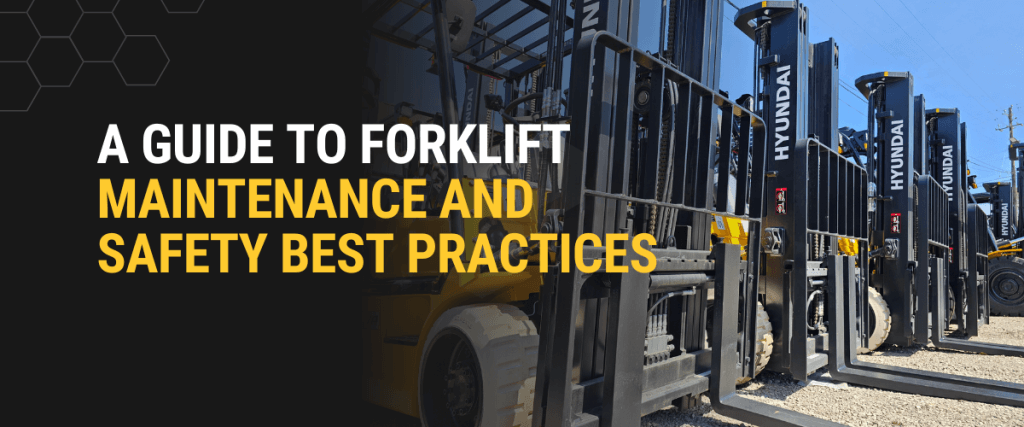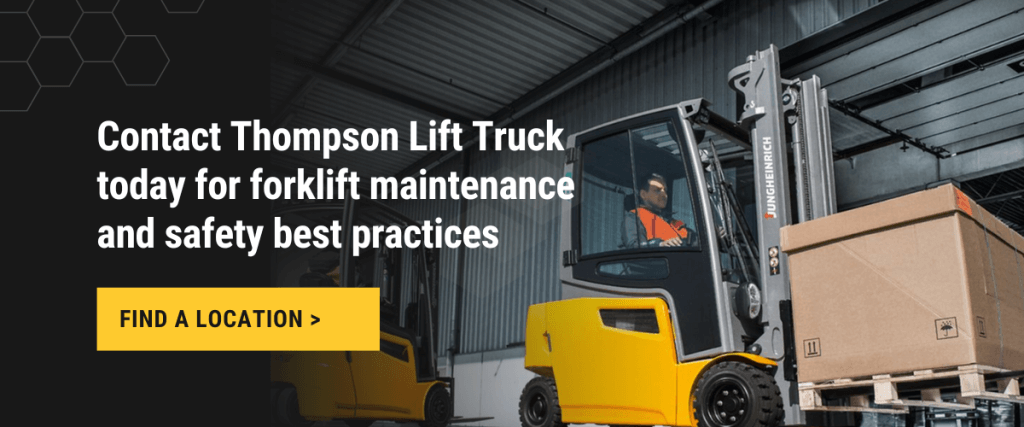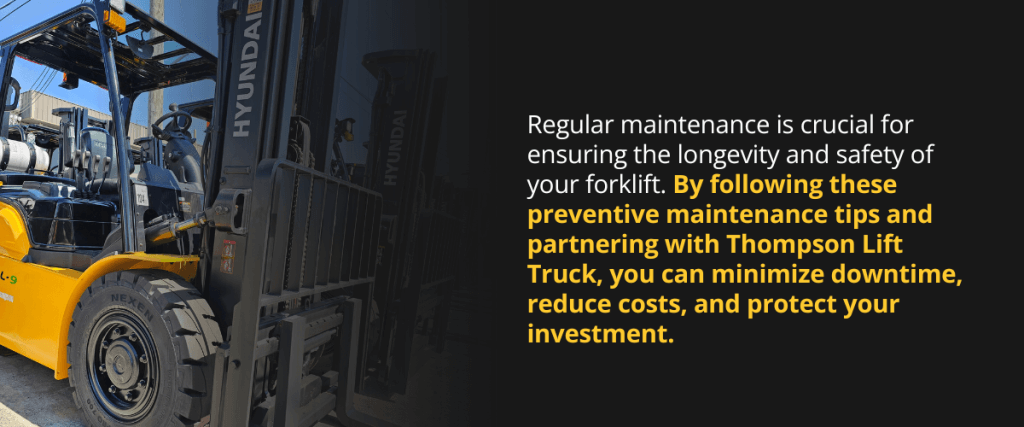
A Guide to Forklift Maintenance and Safety Best Practices

Forklifts are essential tools in many industries, from manufacturing and warehousing to construction and agriculture. However, they can also pose significant risks if not maintained properly or operated safely. Regular forklift maintenance and operator training are crucial to protecting your investment and ensuring the safety of your workforce.
Common Forklift Problems
Like any piece of machinery, forklifts are prone to specific problems that can impact performance and safety. One frequent issue is battery problems, as weak or damaged batteries can cause reduced performance or lead to unexpected breakdowns.
Hydraulic leaks are another common issue; leaks in the hydraulic system may result in a loss of lifting power, creating significant safety hazards. Tire problems, such as worn or damaged tires, can also compromise forklift stability, increasing the likelihood of accidents.
Lastly, engine issues—including overheating and oil leaks—can drastically affect forklift reliability. Addressing these problems through routine maintenance is crucial for ensuring both forklift efficiency and operator safety.
- Battery issues: Weak or damaged batteries can lead to reduced performance and unexpected breakdowns.
- Hydraulic leaks: Leaks in the hydraulic system can cause loss of lifting power and potential safety hazards.
- Tire problems: Worn or damaged tires can compromise stability and increase the risk of accidents.
- Engine problems: Overheating, oil leaks, or other engine issues can affect forklift performance and reliability.
Regular maintenance is crucial for ensuring the longevity and safety of your forklift. By following these preventive maintenance tips and partnering with Thompson Lift Truck, you can minimize downtime, reduce costs, and protect your investment.

1. Regular Inspections:
Consistent, daily inspections are the cornerstone of proper forklift maintenance. Daily checks help operators identify visible damage, leaks, or unusual noises before they become more serious problems.
Specific focus areas should include the tires, lights, brakes, steering mechanisms, and the mast, as these are critical components for safe operation. These key areas of the forklift can reveal potential safety issues or the need for repair early on.
In addition to these self-checks, partnering with professional service providers can be beneficial. For instance, Thompson Lift Truck offers comprehensive inspection checklists and training to help identify problems early and extend the lifespan of your forklifts.
- Daily Checks: Conduct daily inspections to identify any visible damage, leaks, or unusual noises.
- Key Areas: Focus on tires, lights, brakes, steering, and the mast.
- Our technicians can provide comprehensive inspection checklists and training to help you identify potential issues.
2. Fork and Attachment Inspections:
Regularly inspecting the forks and attachments is essential for maintaining safe operations. Forks should be checked for signs of warping, cracks, or other damage, as these can cause unbalanced loads and potentially lead to fork failure when lifting heavy materials.
Additionally, attachments such as clamps should be thoroughly inspected, as worn or damaged attachments can affect forklift performance and safety. Adding these to your inspection routine can prevent breakdowns and ensure operational efficiency.
- Inspect Forks for Warping or Cracks: Regularly check for any signs of damage or distortion that could lead to unbalanced loads.
- Check Attachment Condition: Examine forklift attachments, such as clamps, for wear and tear that may affect functionality.
- Ensure Proper Attachment Fit: Make sure all attachments are securely fastened and functioning correctly to prevent operational hazards.
- Look for Stress Fractures: Monitor for any signs of fatigue on forks and attachments, particularly after handling heavy loads.
- Replace Damaged Parts Promptly: Immediately address any wear or damage to forks and attachments to avoid accidents and equipment failure.
3. Fluid Checks:
- Engine Oil: Monitor oil levels and quality to prevent engine damage.
- Hydraulic Fluid: Ensure hydraulic fluid levels are adequate and the fluid is clean.
- Coolant: Check coolant levels and condition to prevent overheating.
Thompson Lift Truck can provide the necessary tools and expertise to check and maintain fluid levels accurately.

Benefits of Investing in Professional Forklift Service
Engaging professional services for your forklift maintenance offers numerous benefits, both in terms of productivity and cost management. One major advantage is increased uptime, as regular maintenance helps prevent breakdowns and keeps forklifts running efficiently.
Additionally, reduced costs can be achieved by addressing minor issues before they escalate into major, expensive repairs. Professional maintenance also plays a pivotal role in improving safety by ensuring that forklifts are less likely to malfunction or cause accidents.
Finally, professional service ensures compliance with industry safety standards, protecting your business from potential violations or legal consequences.
- Increased uptime: Regular maintenance can help prevent breakdowns and keep your forklift operating efficiently.
- Reduced costs: Preventive maintenance can help avoid costly repairs and replacements.
- Improved safety: Well-maintained forklifts are less likely to malfunction and cause accidents.
- Compliance: Professional service can help ensure your forklift meets industry safety standards.
Forklift Operator Training
Forklift operator training is essential for ensuring safe and efficient operation of these powerful machines. By investing in training, you can:
1. Safe Operation:
Safe operation is a primary focus of training programs, equipping operators with proper techniques for driving, lifting, and lowering loads. Training also improves maneuverability, as operators learn to navigate tight spaces and work in a variety of environments while maintaining forklift stability to avoid tipping.
- Proper Techniques: Training equips operators with the skills to drive, lift, and lower loads safely and effectively.
- Maneuverability: Operators learn how to navigate tight spaces, avoid obstacles, and operate forklifts in various environments.
- Stability: Training emphasizes the importance of maintaining forklift stability during operations to prevent tipping.
2. Accident Prevention:
Proper operator training helps with accident prevention, teaching employees to recognize hazards, avoid collisions, and secure loads to prevent shifting or falling.
- Risk Mitigation: Training helps operators identify potential hazards and take appropriate precautions to avoid accidents.
- Collision Avoidance: Operators learn how to safely maneuver around pedestrians, other vehicles, and obstacles.
- Load Stability: Training focuses on securing loads properly to prevent them from shifting or falling.
3. Compliance:
Forklift operator training is essential for compliance with legal standards. Businesses can avoid legal repercussions, reduce insurance costs, and minimize liability by ensuring operators are adequately trained and certified.
- Industry Standards: Operator training is often a requirement for complying with industry regulations and safety standards.
- Legal Obligations: Businesses may face legal consequences for operating forklifts without properly trained operators.
- Insurance: Adequate operator training can help reduce insurance premiums and liability risks.
By investing in forklift operator training, you can protect your workforce, minimize accidents, and ensure your operations comply with industry standards.
The Latest Safety Regulations
Remaining up to date with the latest safety regulations is crucial to maintaining a safe working environment. Regulations may require operator certification, ensuring that all forklift operators are trained and licensed to use the equipment safely.
Additionally, there are often guidelines surrounding the frequency and scope of inspections, ensuring that forklifts remain in good working condition. Businesses must also comply with load capacity restrictions to avoid overloading forklifts, which can cause accidents or damage to the machinery.
General workplace safety regulations further emphasize the importance of safe forklift operation within the context of broader industry standards.
- Operator certification: Requirements for operator training and certification.
- Equipment inspections: Frequency and scope of inspections.
- Load capacity: Limits on the weight of loads that can be lifted.
- Workplace safety: General safety standards for forklift operation.
By prioritizing forklift maintenance and operator safety, you can protect your investment, enhance your productivity, and create a safer working environment.
